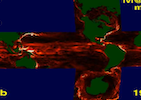Climate Modeling
I am director of MIT’s Climate Modeling Initiative (CMI) which is developing a new generation climate model exploiting our latest understanding of ocean, land, atmospheric and biogeochemical processes, and new developments in algorithms, computing technology and software design. The approach is wide-ranging and encompasses algorithmic, computational, physical and technological innovations, drawing together elements of computational fluid dynamics, statistics, meteorology, oceanography and computer science.
One important product of this activity has been the development of a widely used ocean modeling tool – the MITgcm – which was the first non-hydrostatic model applied to the convective scale in the ocean. This has facilitated numerous studies of ocean circulation and climate, from the convective scale right up to that of the planet. With the help of colleagues at MIT it has been the test bed of many algorithmic innovations that have and are being adopted at modeling centers around the world:
- representation of topography in ocean models [35]
- non-hydrostatic, quasi-hydrostatic and hydrostatic algorithms [37], [38]
- treatment of the Coriolis force in models [47],
- the expanded spherical cube [79]
- ensuring conservation in free-surface models [80]
- atmosphere and ocean modeling exploiting fluid isomorphisms [86]
- formulation of residual-mean ocean models [97]
- seaice-ocean coupling using rescaled vertical coordinates [106].
Our model development activity has also created a cadre of highly skilled modelers who use numerical experimentation for science rather than simulation. The forward model, together with its tangent linear and adjoint components, is the enabling technology of global ocean state estimation efforts (ECCO) that have been pioneered by Carl Wunsch at MIT. My modeling activities have also provided the context for the study of ocean biogeochemical cycles and self-assembling ecosystem models in the Darwin Project being pursued by Mick Follows and his group at MIT.
In recent years (beginning in 2010) I have begun a close collaboration with the Goddard Institute for Space Science (GISS, at Columbia University in New York City), working with them to develop and improve the GISS ocean model.



